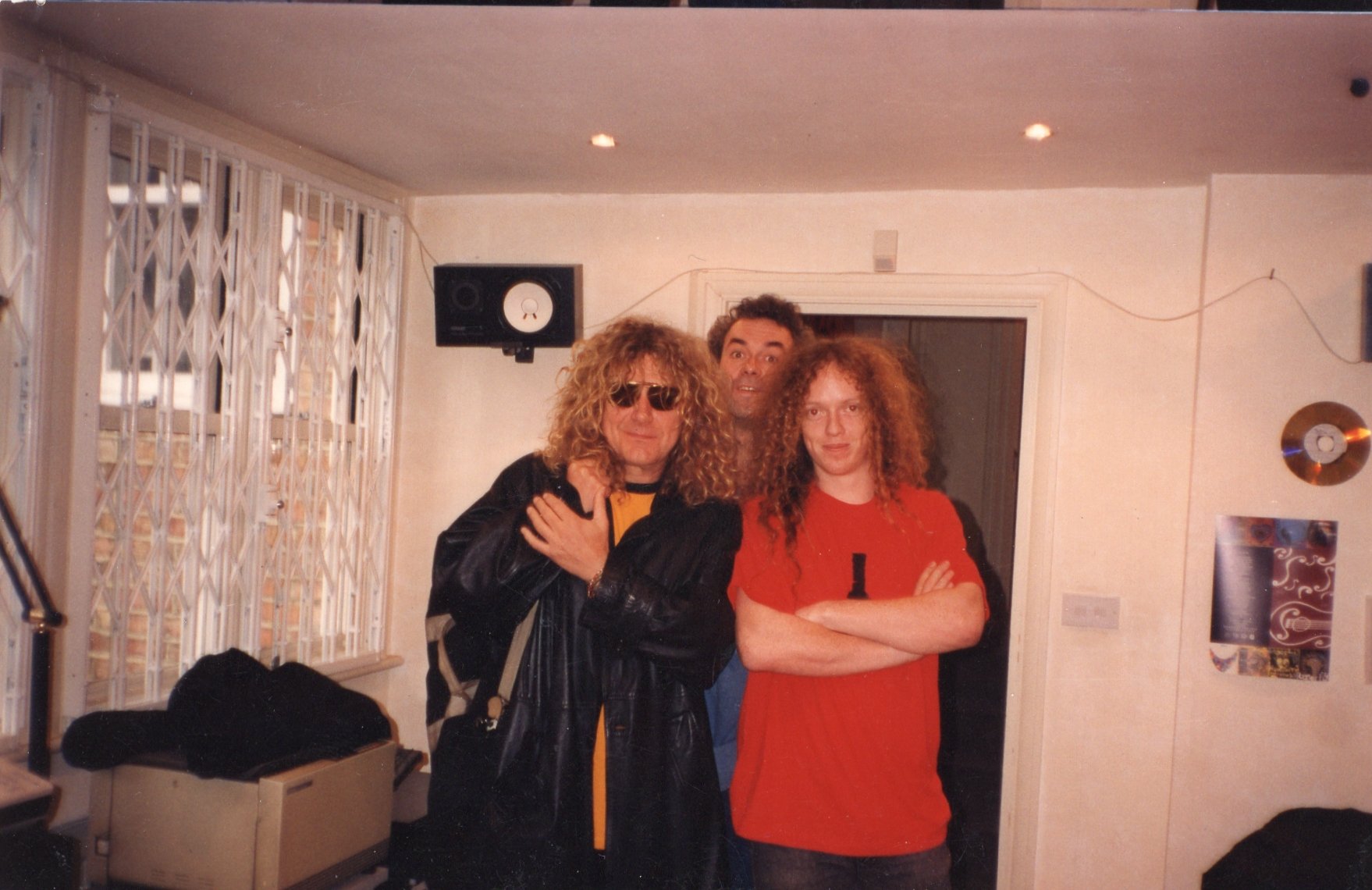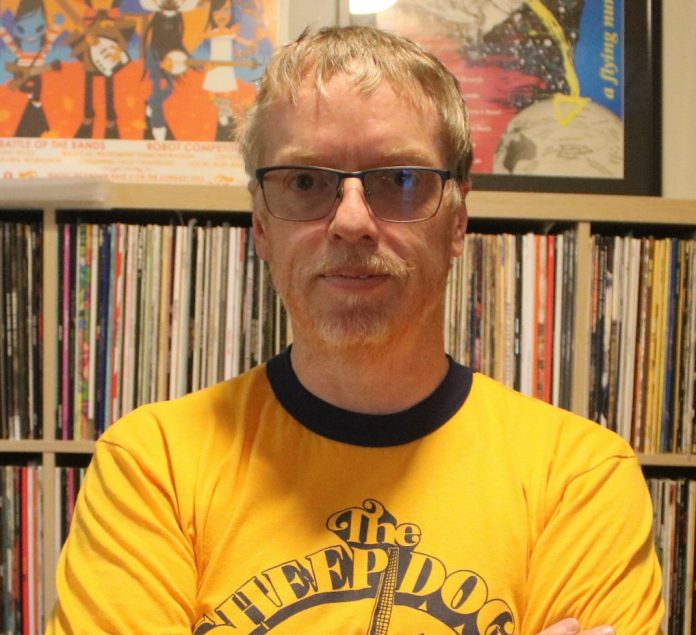He was in the room when a young Noel Gallagher played an acoustic Wonderwall publicly for the first time, and has shared an office with Ricky Gervais. Classic Rock magazine online editor Fraser Lewry talks to Ashley Smyth about what got him there, and what has now brought him here.
Fraser Lewry may just be the most interesting person you didn’t know lived in Oamaru.
The Kiwi-born ex-Londoner has a long list of achievements on his CV, not least of which is featuring in documentary Kick Out The Jams: The Story of XFM, about the early days of a ground-breaking British radio station, released in the UK last week.
He is online editor for Classic Rock magazine — which at last check had more than 1.7 million Facebook followers; had a cooking column in The Guardian newspaper (‘‘Fraser Lewry’s Animal Alphabet’’ — yes it is exactly as it sounds, octopus and ostrich surf ’n’ turf, anyone?); and started a cult website: Kittenwar! May the Cutest Kitten Win!
Mr Lewry was born in Wellington to ‘‘£10 Pom’’ parents who moved to New Zealand in the 1950s, met, got married, had two children and moved the family back to London in 1979, when he was 12.
He had always wanted to work in the music industry, and even based his choice of university around being ‘‘where the music was’’.
‘‘I applied to five different schools in London . . . I wanted to be somewhere where I could go out every night and watch bands play, and so I got into a college, and then left after a year, to go and work in a record shop, because that seemed like a more sensible career move.’’
From there, Mr Lewry landed a job as a roadie for a band, which had some success — playing at Glastonbury and Reading music festivals and garnering television and radio airtime.
‘‘For a while they had a sound man, who went on and started a radio station — it was a station that was based in the offices of the band The Cure, and so for a while he employed me as a kind of a station lackey, for want of a better word.’’
That station was XFM, and it started off with two-week trial broadcasts, a couple of times a year between 1992 and 1996, before gaining a broadcasting licence.
‘‘During those trials I would literally live at the station. I would sleep overnight on the sofa, I would get up at 6am to greet the first DJ in and I would work through till 2am the following morning, sleep for four hours on the sofa, and get up and do it all over again, not showering, seven days a week.

Fraser Lewry (right) with former Led Zeppelin frontman Robert Plant (left) during the first Xfm trial broadcast in 1992. Fontana Records’ David Bates is in the background. PHOTO: SUPPLIED
‘‘I’d go home once a week for a break, and then come back to the station again.’’
The station started up just before Britpop bands like Blur, Oasis, Radiohead and Supergrass were household names.
‘‘So we got a kind of a reputation for supporting underground music and new bands, before this huge, big successful wave, and so when those bands started coming through, the first port of call was us,’’ Mr Lewry said.
‘‘We were the first radio station to playlist Radiohead, we were the first radio station to playlist Oasis.
‘‘When Noel Gallagher played on acoustic guitar Wonderwall for the first time publicly, I was sitting in the same room. Lots of stuff like that.’’
Mr Lewry described XFM as being in the right place at the right time in its early days, but by the time it was able to broadcast permanently, it was 1997.
‘‘We kind of missed the boat a little bit, in the sense that all the exciting part of Britpop had kind of been and gone by that point.’’
A year later the owners decided to sell it to a much bigger radio group, and he walked away in disgust.
During that year, though, Mr Lewry was head of music and shared an office with head of words, a pre-The Office Ricky Gervais, who then hired his assistant, Stephen Merchant.
‘‘I loved working with Ricky. What you see on TV is exactly what he’s like in real life. That laugh is a permanent fixture.
‘‘I think quite a lot of the people in XFM may have informed characters in The Office. So, for instance, one of the assistants at the radio station was David Keenan, and there was Gareth Keenan in The Office.
‘‘The guy who was the station controller was partly the inspiration for David Brent, and there are scenes in The Office where I was present when they happened in real life at the radio station.
‘‘So I think Ricky was making notes all that time, and was able to use them and put together this fantastically successful comedy.’’
By the time he walked away from XFM, it was 1999, and Mr Lewry decided the internet was the next exciting place to be.
For a couple of years, he had a job with a network of European MP3 download sites, with offices around Europe and eventually the United States.
‘‘At the same time I was doing stuff on the side. I was fascinated by the internet, so I started blogging quite early on, and I’d built a couple of websites with a friend.
‘‘One was called Kittenwar. We had two pictures of kittens, and you vote for which one is the cutest, and that got quite successful. We were on the front cover of a couple of papers in the UK, and on the Stephen Colbert show — he put it up a couple of times.’’
He tried his hand at food blogging too, with experimental creations such as Pepto-Bismol ice cream — ‘‘simply because, to me, ice cream was a hangover cure, and Pepto-Bismol is a hangover cure, so it was put together in one handy package’’ — and a Scotch egg using an ostrich egg.
This led to his cooking column in The Guardian, one of the UK’s most respected newspapers.
‘‘I did an A to Z of weird animals that you could cook . . . so from ants to zebra, literally, with a different strange animal every week. I’d put a dish together and photograph it.’’
Next he got a job building a website and writing for a music magazine called The Word, which in turn landed him at Classic Rock.
‘‘I’m the online editor, which basically means I am responsible for making sure lots of content goes up every day. So that’s either commissioning people to write stuff, or it’s writing stuff myself. Or it’s taking stuff directly from the magazine and putting it online.
‘‘I start every day and I have no idea what I’ll be writing about or doing. Yesterday, I wrote a story about the fact that Ozzy Osbourne stopped taking LSD after he spent an hour conversing with a horse.’’
The job also occasionally involved interviewing musicians — including members of Led Zeppelin, Def Leppard, Deep Purple, Guns N’ Roses, the Sex Pistols, Thin Lizzy and Genesis.
‘‘Also David Duchovny, for some reason.’’
Probably the least interesting part of Mr Lewry’s life to date is what has landed him in Oamaru in August 2020.
A return to New Zealand for the 2011 Rugby World Cup was ‘‘an absolute ball’’, and then in 2013 and again 2017, he explored a bit further, eventually with a view to moving back long-term.
He liked Oamaru — it ‘‘checked a lot of the boxes’’.
‘‘I knew I wanted to be on the South Island, because I hadn’t been there before; I knew I wanted to be by the sea; I knew I wanted to be in a town that was small enough to walk around, while I learnt to drive — because in London no-one drives.’’
The town was also not the ‘‘cultural deadspot’’ he initially thought it might be, with ‘‘brilliant stuff’’ at Donna Demente’s Grainstore Gallery, and great gigs at the Early Settlers Hall, Loan and Merc building, and the Oamaru Club.
He enjoyed the rhythms of small-town life, that you didn’t notice in a big city.
‘‘I like the fact the paper arrives on Thursday, and I look through it and there’s people that I know in it, and I like the fact, in a town this small, someone can actually move here and make a difference.
‘‘Like, I think, for instance, with the Business Hive, that’s there, and it’s improved the town, and that’s not something you can do in London unless you’re the mayor, you know.
‘‘I like the fact I can look up at night and see the stars.
‘‘So, although I miss going to gigs all the time, I’ve swapped it for other things I appreciate.’’
Mr Lewry still works fulltime — two days from home, and three days at the Business Hive’s communal office space, which he said kept him sane.
‘‘It makes sure I’m having conversations with real people, and it’s kind of become almost like the centre of my social universe, in a sense that the people I know and go out with, I’ve met through the Business Hive.’’
Being in Oamaru had its disadvantages, but the time difference was not one of them.
‘‘When Taylor Hawkins dies in the middle of the night, I’m able to write a story and get something out in 20 minutes, while the UK is still asleep.’’
He could also clear his emails every morning and then not be bothered for the rest of the day.
As well as being his work, music was also life for him.
He had ‘‘very, very wide taste’’ in music, and most evenings would sit down with a glass of wine and listen to an album.
‘‘Or I’m watching music documentaries on the TV. It doesn’t feel like an obsession, but it probably is.’’
Kick Out the Jams: The Story of XFM was named after the song Mr Lewry chose to be played first on the station when it launched full-time in London, almost 25 years ago to the day.
The time remains the highlight of his career.
‘‘It was a fantastic job, surrounded by fantastic, smart, funny people, and also it just felt like we were at the epicentre of something that was exciting and important, and kind of a little bit revolutionary.
‘‘It felt like when we were on the air doing the little trial broadcasts, that everyone was really excited.
‘‘It felt like we were at the centre of the universe, you know, everyone wanted to be part of it.’’




